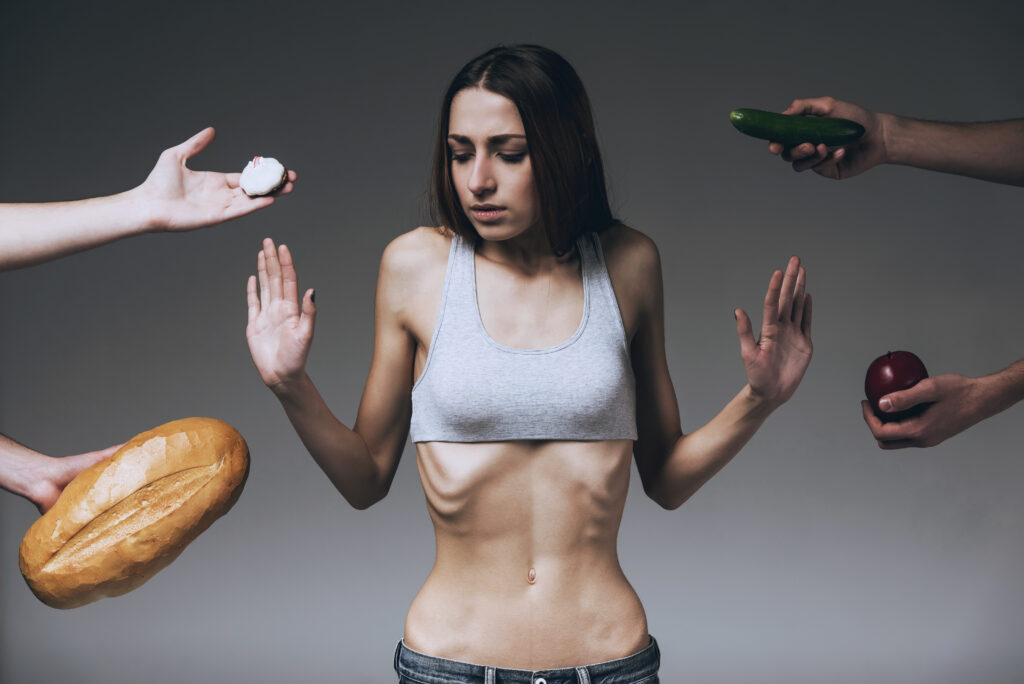
The Harms of Being Pro-Anorexia
Eating disorders are illness that affects the lives of millions of American’s of all ages. Despite a long-standing misconception, it is essential to remember that an eating disorder is not a struggle “by choice” or “in the head” of the person suffering. The statistics from the National Association of Anorexia Nervosa and Associated Disorders or ANAD indicate how widespread the prevalence of disordered eating is in the United States.
- Every 62 minutes, at least one person dies from complications directly liked to disordered eating.
- In the United States, more than 30 million people of all ages, races, and genders suffer from at least one form of disordered eating.
- Eating disorders are one of the deadliest mental illnesses (second only to opioid and overdose).
What is Anorexia?
Someone who suffers from anorexia nervosa is motivated by the need to stay thin. Some of the common symptoms of anorexia nervosa include low blood pressure, anxiety, dehydration, low body weight, mismatched body weight perception, and altered eating habits. Without mental health treatment, the effects of anorexia nervosa will have a significant and dangerous impact on the physical and psychological health of the individual.
Anorexia nervosa has the highest mortality rate of all forms of disordered eating. Some statistics show it has the highest of all mental illnesses. Recent data indicates as many as 4% of all women (regardless of age) are diagnosed with anorexia nervosa in their lifetime. Although anorexia nervosa can occur at any age, the average age of onset is in one’s early teens or about the beginning of puberty. A study conducted in 2003 on female teens with anorexia nervosa indicated that they were 56 times more likely to attempt or commit suicide than those without the disorder. Additionally, females diagnosed with anorexia nervosa are more than twelve times more likely to die from complications linked to anorexia than women without the illness.
What is “Pro-Ana?”
The term “pro-ana” is short for pro-anorexia. It is a term used to reference (typically) online content that promotes the harmful mindset and associated behaviors that accompany some eating disorders, including anorexia. It is often a collection of blogs, chat forums, or websites that offer content related to eating disorders. The social media outlets or websites where pro-ana content is generally found often imply or outright say that this type of behavior is a lifestyle choice instead of a direct symptom of a potentially deadly mental health disorder.
The content found on pro-ana sites frequently praises weight loss and perception of healthy weight and size. Content on pro-ana sites is not limited to words. Photographs on the pages often represent people who are thin, making those who struggle with an eating disorder feel self-conscious about their weight, even if they are at an average healthy weight.
It is important to remember that anyone can host or run a pro-ana site. For someone who struggles with these behaviors or experiences frequent thoughts about engaging in these behaviors, the information provided on social media sites and pro-ana websites seeking help at a treatment center like The Meadowglade is a safer, more effective way to process your worries or emotions.
Why Does Pro-Ana Content Exist?
It is important to remember that pro-ana sites are not necessarily intended to be harmful or malicious. There is a widespread assumption that people who promote or create content for pro-ana websites are out to intentionally cause harm or misrepresent the symptoms of an eating disorder as a voluntary choice. However, while this may be the case in some instances, there are circumstances where individuals posting content on pro-ana sites are suffering from eating disorders themselves.
Eating disorders are complex and challenging mental illnesses. It is not uncommon for someone who struggles with an eating disorder such as anorexia to experience complex emotions about their illness and the possibility of recovery. With this in mind, some content on pro-ana sites or profiles may contain content that acknowledges the painful and potentially dangerous reality of living with an eating disorder. For some, posting on these websites is the way to seek support from others who experience the same challenges. Unfortunately, these websites are not necessarily the healthiest way to find peer support. If you are looking for a positive space to explore your relationship with food, working with a treatment team and peer support at a treatment center like The Meadowglade is a safer, more beneficial way to begin your journey to recovery.
Why is Pro-Ana Content Harmful?
Although it may not be intentional, the content found on pro-ana sites is indeed harmful. It is also dangerous to someone currently struggling with an eating disorder or someone vulnerable to developing an eating disorder in time. Pro-ana content can lead to further negative body image and self-esteem problems. It can worsen pre-existing feelings and push someone towards setting dangerous and unhealthy goals or rules surrounding food. Unfortunately, the content on these sites implies (even if unintentionally) that the self-destructive behavior associated with eating disorders is a choice rather than an illness. Reinforcing the voluntary nature of an eating disorder only leads to worsening symptoms and increased difficulty achieving recovery.
The content and design of these sites appear to be peer advice; however, much of what they portray is the opposite of medically safe advice. In addition to photos, other worrisome content often seen on pro-ana sites includes referring to eating disorders as “friends” with the name Ana, peer support of eating disorder behaviors, tips on how to keep harmful behaviors a secret, suggestions for how to suppress hunger, and thinspiration in the form of photographs of people whose body weight represents a “goal” for someone with anorexia.
Sadly pro-ana websites and social media groups are easy to locate with a simple online search. Often, the names of the site or social group clearly indicate their purpose. Perhaps most unfortunate is the fact that these sites provide someone already struggling with a dangerous mental illness a way to maintain their current course. Some sites even go as far as to clearly state their sites are not designed for someone in recovery from an eating disorder. Instead, they are intended for someone who has decided anorexia (or other forms of eating disorders) is a chosen lifestyle. Some sites even actively avoid using the term “anorexic,” as it may suggest there is something wrong or harmful with engaging in anorexic behaviors.
Perhaps one of the greatest dangers of pro-ana sites is the fact that they depict engaging in anorexic behaviors as “taking charge” of one’s relationship with food. Consider for a moment the millions of people who struggle with body image and weight concerns yet maintain their current dietary and exercise choices. Pro-ana sites view someone with anorexia as being superior or elite in thoughts and actions related to food and weight. Where most people do not “do what is needed” to achieve their body image goals, someone with anorexia does. This is a dangerous and potentially deadly way of thinking that can lead to extreme medical consequences.
Treatment for Anorexia
Although pro-ana sites may appear as a strong source of support for someone with anorexia, the thoughts and attitudes presented on these sites are indeed dangerous as it does not promote seeking recovery. When someone has an eating disorder, it is vital to seek help and support from a treatment center like The Meadowglade, where the staff and peers support a healthy recovery journey.
Most therapy programs for eating disorders involve a combination of behavioral therapy, medication, and nutritional education. The type and duration of treatment that works best for you will vary based on several personal factors. However, it is essential to note that eating disorders do not resolve on their own, and they are not a lifestyle choice. Eating disorders are dangerous mental health conditions that can have permanent medical consequences.
Eating disorders are linked to the deaths of millions of people of all ages and genders every year. If you or a loved one struggles with anorexia or another eating disorder, it is vital to seek help to overcome symptoms. Without comprehensive medical and mental health care, the lasting effects of a long-term eating disorder can lead to potentially fatal medical complications. At The Meadowglade, you will work with members of our treatment team to design an individually designed program that focuses on your holistic needs as you begin your recovery. We will ensure your physical, emotional, and spiritual needs are met throughout your stay.
The “best” types of therapy and other elements in your treatment plan will depend on your needs. For many who struggle with anorexia, the first step in treatment is to address any co-existing medical conditions that exist due to eating disorder behaviors. While it may take several weeks to stabilize your health and reestablish healthy levels of vitamins and nutrients, it is vital to ensure your medical health is stable before working on your mental health.
The most effective eating disorder treatment generally involves a combination of behavioral therapies, medication (if appropriate), nutritional education, and peer support groups. The peer support found as part of an eating disorder treatment program is a vital part of lasting recovery for many as it provides lasting relationships with people who share the same goals. If you are struggling with feelings and emotions related to harmful behaviors after treatment ends, having a group of peers who support your ongoing recovery can be vital to avoiding relapse.
At The Meadowglade, we know acknowledging a struggle with an eating disorder is difficult but seeking help to begin the process of healing is vital to achieving lasting recovery. If you struggle with an eating disorder or are concerned about a loved one, contact our Los Angeles area eating disorder treatment center today. Let us help you begin your journey towards recovery.
https://www.ncbi.nlm.nih.gov/pmc/articles/PMC7926357/
http://www.sirc.org/articles/totally_in_control2.shtml
https://www.newsweek.com/dangers-pro-anorexia-web-sites-105601
